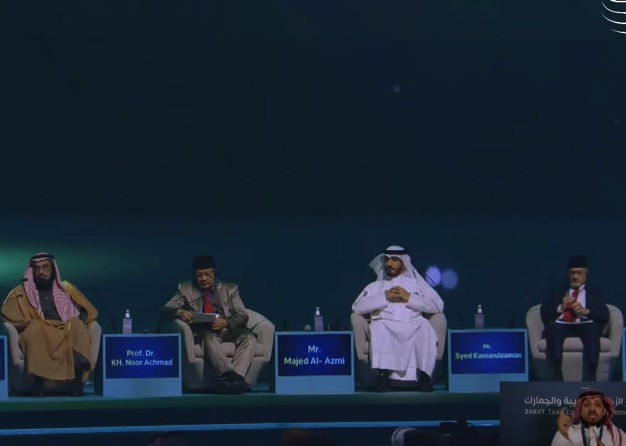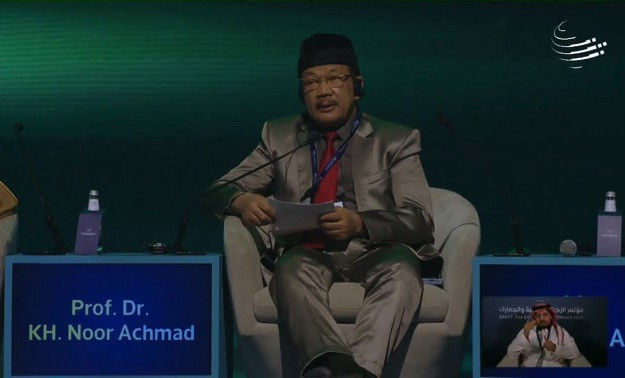Popular Reads
Top Results
Can't find what you're looking for?
View all search resultsPopular Reads
Top Results
Can't find what you're looking for?
View all search resultsBAZNAS Indonesia’s Zakat Success Echoes at ZATCA Conference in Saudi Arabia
Change text size
Gift Premium Articles
to Anyone
C
hairman of the National Zakat Board (BAZNAS) of Indonesia, Noor Achmad, highlighted the institution's success in managing zakat, infaq and sadaqah (ZIS) funds to alleviate poverty in Indonesia.
Speaking at the fourth panel discussion of this year’s Zakat, Tax and Customs Authority (ZATCA) Conference in Riyadh on Dec. 4, the opening day of the two-day event, professor Noor was accompanied by several BAZNAS leaders including distribution and utilization head Saidah Sakwan, chief secretary Muchlis Muhammad Hanafi and fundraising director Faisal Qosim.
Themed "Comparative Perspectives on Zakat Practices Internationally", the discussion also featured speakers from Saudi Arabia’s Ministry of Social Affairs, Bait Zakat Al-Kuwait (Kuwait Zakat House) and Malaysia’s Federal Territory Islamic Religious Counci (MAWIP).
Noor presented Indonesia's achievements in reducing poverty by March 2024 to 25.22 million people, including a dramatic drop in extreme poverty in the decade between 2014 and 2024 from 6.20 percent to 0.83 percent. He attributed these milestones to strategic policies, particularly measures to optimize zakat funds.
“Zakat has been effectively utilized for economic empowerment and integrated social distribution aligned with national policies, supported by Presidential Instruction No. 4 of 2022. This approach positions zakat as both a redistributive and sustainable empowerment tool, significantly impacting the economic and social welfare of mustahik [zakat recipients],” Noor told the discussion.
He also explained that BAZNAS programs integrated poverty alleviation and the United Nations Sustainable Development Goals (SDGs) through a holistic approach that encompassed economic, social and advocacy dimensions.
For example, economic initiatives such as Z-Mart, Z-Chicken and BAZNAS Microfinance provided mustahik with access to business capital, production resources and markets.
(Courtesy of BAZNAS)“On the social front, BAZNAS focuses on reducing stunting, providing sanitation facilities through the WASH program and offering scholarships to enhance access to basic, developmental and emergency needs. Advocacy supports these efforts through policy development, networking and capacity building to strengthen the zakat ecosystem,” Noor said.
He emphasized that these programs aimed to transform mustahik into muzaki (zakat contributors), as outlined in the agency’s poverty eradication framework.
“This process includes distribution and empowerment phases leading to 'moving out of poverty' [MOP] and 'moving out of mustahik' [MOM], ensuring the sustained material and spiritual well-being of mustahik,” he added.
Noor also underscored the agency’s adherence to the Three Safeguards principle of Aman Syari', Aman Regulasi and Aman NKRI, sharia compliance, regulatory compliance and national security. Keeping to with these principles ensured that zakat funds were managed in accordance with Islamic law, Indonesian regulations and national unity.
“In 2024, zakat-based poverty alleviation programs have demonstrated significant impact. Zakat management not only fulfills a religious mandate but also supports Indonesia’s national agenda for sustainable development and poverty eradication,” he said.
The ZATCA Conference 2024 saw the participation of 5,000 delegates from around 30 countries. The event aimed to enhance international collaboration in zakat, taxation and customs, offering innovative solutions to economic challenges amid rapid digital transformation.











